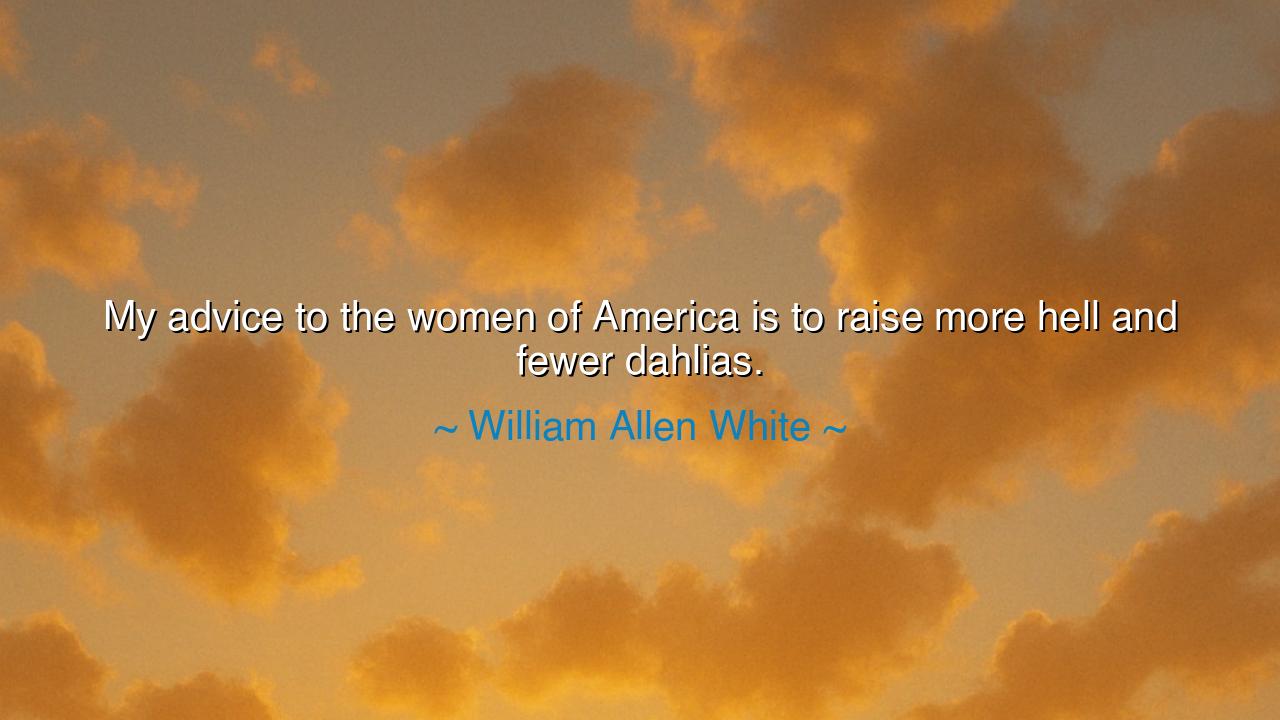
My advice to the women of America is to raise more hell and






Hear, O daughters of America, the fiery words of William Allen White, who proclaimed: “My advice to the women of America is to raise more hell and fewer dahlias.” In this saying lies not disdain for beauty, but a summons to courage. White, a journalist of Kansas, saw in women not only keepers of gardens and homes, but warriors for justice. To raise more hell is to defy silence, to agitate, to demand change; while to grow dahlias alone is to confine power to decoration when the world cries out for transformation.
For in the early 20th century, women stood on the threshold of suffrage. Many still believed their role was merely to adorn society, to be gentle, pleasing, and ornamental. White’s words were a rallying cry: that America needed their voices, their demands, their righteous unrest. The beauty of flowers could brighten a room, but the beauty of women’s courage could brighten a nation.
Consider the suffragists who marched through the streets, endured jeers, and went to prison for the vote. Alice Paul and her sisters chained themselves to the White House gates, went on hunger strikes, and endured force-feeding, all to awaken the conscience of a slumbering nation. They raised hell in a society that preferred them to raise roses. And through their defiance, the 19th Amendment was born, granting women the ballot.
White’s words were rooted in this era of upheaval, where complacency could no longer be afforded. To plant dahlias was not wrong, but to stop there was to accept chains. He urged women to see their true strength, to bring their energy and passion into the realm of politics and public life, where their impact could shape the destiny of generations.
Therefore, let this wisdom endure: there are times for gardens, and there are times for battles. Women must never be told that their highest calling is only to beautify the world; they must also transform it. White’s counsel remains a torch for every age: when injustice reigns, let women—and men—choose courage over comfort, action over silence, and the fire of change over the safety of flowers.






PNPhuongh Nguyen
White’s quote challenges the traditional ‘feminine’ roles women are often expected to play, suggesting they should be more disruptive in their fight for rights and recognition. Do you think this resonates in today’s political climate, where many women are leading protests and movements? Can raising hell—metaphorically speaking—be the key to shifting power dynamics, or does it risk reinforcing the very stereotypes we’re trying to overcome?
APQuynh anh Pham
The quote suggests a powerful call for action, asking women to step outside the confines of expected behavior. While it’s important for women to assert themselves, does this idea of ‘raising hell’ run the risk of perpetuating a more combative, adversarial approach to societal change? How can we be disruptive in a way that drives lasting change without alienating potential allies or creating unnecessary conflict?
MTLe Minh Thu
William Allen White’s call for women to ‘raise more hell’ is an interesting one, considering how often women have been told to stay quiet and conform. It seems like an empowering challenge, but do you think this type of advice might be too radical for some? How do we ensure that this kind of action is effective without being dismissed as mere chaos or rebellion without purpose?
TLthai thanh luan
I love how White’s advice turns the traditional expectations of women upside down. ‘Raise more hell’ is a call for activism and a reminder that silence often doesn’t bring change. Do you think this message might be misunderstood, though? In a society where women are already speaking out more than ever, could it lead to backlash or further stereotyping of women’s actions?
NTlien ngo thanh
William Allen White’s quote is quite bold and challenging. It suggests that women should be more outspoken and assertive, pushing back against societal expectations of them being passive or docile. Do you think this advice still holds true today, or do we see more women already raising their voices in powerful ways across various fields? How can we balance being assertive without falling into the trap of aggression?